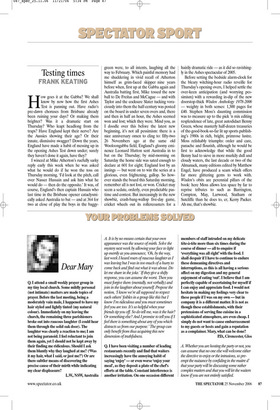Q. I attend a small weekly prayer group in my
tiny local church. Some mildly personal (not intimate) matters are made topics of prayer. Before the last meeting, being a moderately vain male, I happened to have my hair styled and lightly tinted (my natural colour). Immediately on my leaving the church, the remaining three parishioners broke out into raucous laughter (I could hear them through the solid oak door). The laughter was clearly a reaction to me; I am not being paranoid. I feel reluctant to join them again, yet I should not be kept away by their finding me ridiculous. Should I ask them bluntly why they laughed at me? (‘Was it my hair, what I said, or just me?’) Or are there subtler means of discovering the precise cause of their mirth while indicating my clear displeasure?
L.W., NSW, Australia A. It is by no means certain that your own appearance was the source of mirth. Solve the mystery next week by allowing your face to light up merrily as you announce, ‘Oh, by the way, last week I heard roars of raucous laughter as I was leaving but I was in too much of a hurry to come back and find out what it was about. Do let me share in the joke.’ If they give a shifty response, you can assume the worst. Then you must forgive them (mentally, not verbally) and join in the laughter about yourself. Propose the notion, ‘I know we’re all supposed to respect each others’ foibles in a group like this but I know I’m ridiculous and you must sometimes feel you are too. It’s so helpful when your friends tip you off. So do tell me, was it the hair? Or something else? And I promise to tell you if I feel there is something about any of you which distracts us from our purpose.’ The group can only benefit from thus acquiring this new dimension of truthfulness.


























































































 Previous page
Previous page